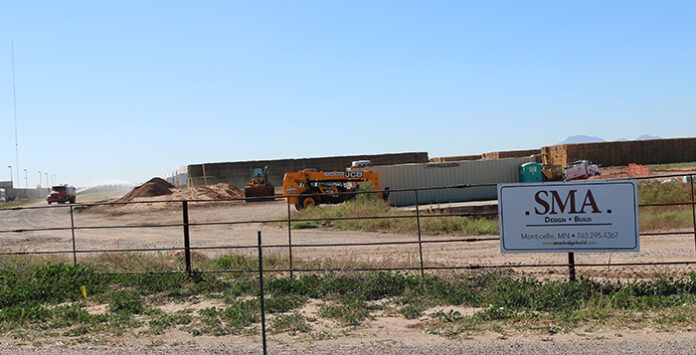
Sacate Pellet Mills Inc. is relocating its main pellet processing plant to Maricopa.
Sacate, now located in Laveen in southwest Phoenix, has been forced to move due to major road construction, the 202-connection project. The main problem in Laveen, where Sacate employs 75 people, is encroaching housing and traffic congestion.
The new Maricopa facility, which is being built in phases, will employ about eight workers at the completion of phase 1 but is expected to eventually grow to exceed 75 employees, according to a Project Narrative presented to the Maricopa City Council that was written by Olsson and Associates of St. Louis, Missouri.
David Stueve, general manager of Sacate, said the new mill project in Maricopa should be completed by June.
The new facility will be used to process a standard 4-by-4-by-8-foot hay bale, which will produce 3/8-inch diameter by 1.5-inch pellets. The hay pellets will be wholesaled to multiple local businesses and retailers.
The plant, located on about 50 acres southeast of Maricopa, near the intersection of Cowtown Road and White and Parker Road, is expected to operate 24 hours per day, according to the Olsson report. The proposed location will house a feed pellet milling operation and office.
The report states: “The work will adhere to Zoning Code … and will occur in three phases. Phase 1 will include grading of the parcel to ensure proper on-site drainage and retention, construction of one fire access road, building of the warehouse, hay canopy, and electrical building. Phase 1 will also see the construction of a security fence and gate to restrict site access and the installation of truck scales. Phase 2 will include an extension to the warehouse and erection of cubing system equipment to the north of the hay canopy. Phase 3 will see the building of an open bale processing canopy and office building with associated parking and sidewalks.”
Sacate is highly respected for producing some of the best quality livestock pellets in the Agriculture industry. The company first produced pellets in 1985.

![3 things to know about the new city budget Vice Mayor Amber Liermann and Councilmember Eric Goettl review parts of the city's 2024 operational budget with Mayor Nancy Smith on April 24, 2024. [Monica D. Spencer]](https://www.inmaricopa.com/wp-content/uploads/2024/04/spencer-042424-preliminary-budget-meeting-web-218x150.jpg)






![MHS G.O.A.T. a ‘rookie sleeper’ in NFL draft Arizona Wildcats wide receiver Jacob Cowing speaks to the press after a practice Aug. 11, 2023. [Bryan Mordt]](https://www.inmaricopa.com/wp-content/uploads/2024/04/cowing-overlay-3-218x150.png)



![Alleged car thief released without charges Phoenix police stop a stolen vehicle on April 20, 2024. [Facebook]](https://www.inmaricopa.com/wp-content/uploads/2024/04/IMG_5040-218x150.jpg)

![3 things to know about the new city budget Vice Mayor Amber Liermann and Councilmember Eric Goettl review parts of the city's 2024 operational budget with Mayor Nancy Smith on April 24, 2024. [Monica D. Spencer]](https://www.inmaricopa.com/wp-content/uploads/2024/04/spencer-042424-preliminary-budget-meeting-web-100x70.jpg)


